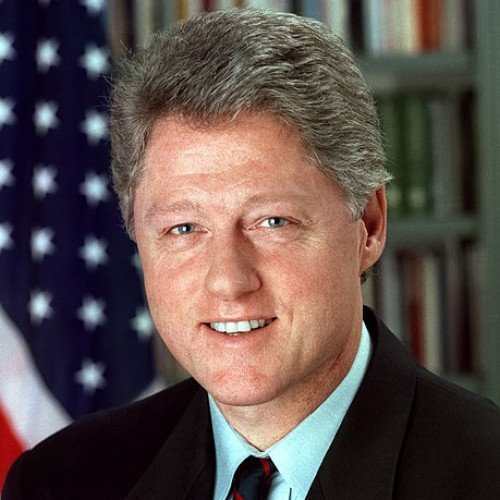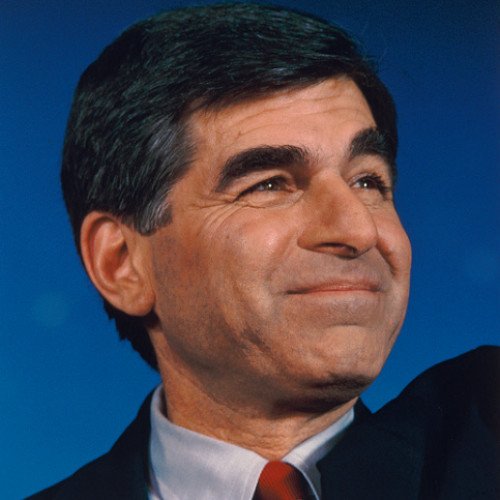Bill Clinton VS Michael Dukakis

Bill Clinton
William Jefferson Clinton (né Blythe III; born August 19, 1946) is an American lawyer and politician who served as the 42nd president of the United States from 1993 to 2001. Prior to his presidency, he served as governor of Arkansas (1979–1981 and 1983–1992) and as attorney general of Arkansas (1977–1979). A member of the Democratic Party, Clinton was known as a New Democrat, and many of his policies reflected a centrist "Third Way" political philosophy. He is the husband of former secretary of state, former U.S. senator, and two-time candidate for president Hillary Clinton. Clinton was born and raised in Arkansas and attended Georgetown University, University College, Oxford, and Yale Law School. He met Hillary Rodham at Yale and they were married in 1975. After graduating from law school, Clinton returned to Arkansas and won election as state attorney general, followed by two non-consecutive terms as Arkansas governor. As governor, he overhauled the state's education system and served as chairman of the National Governors Association. Clinton was elected president in 1992, defeating incumbent Republican President George H. W. Bush. At age 46, he became the third-youngest president in history. Clinton presided over the longest period of peacetime economic expansion in American history. He signed into law the North American Free Trade Agreement (NAFTA) and the Violent Crime Control and Law Enforcement Act, but failed to pass his plan for national health care reform. In the 1994 elections, the Republican Party won unified control of Congress for the first time in 40 years. In 1996, Clinton became the first Democrat since Franklin D. Roosevelt to be elected to a second full term. He passed welfare reform and the State Children's Health Insurance Program, as well as financial deregulation measures. He also appointed Ruth Bader Ginsburg and Stephen Breyer to the U.S. Supreme Court. During the last three years of Clinton's presidency, the Congressional Budget Office reported a budget surplus—the first such surplus since 1969. In foreign policy, Clinton ordered U.S. military intervention in the Bosnian and Kosovo wars, signed the Dayton Peace agreement, signed the Iraq Liberation Act in opposition to Saddam Hussein, participated in the Oslo I Accord and Camp David Summit to advance the Israeli–Palestinian peace process, and assisted the Northern Ireland peace process. In 1998, Clinton was impeached by the House of Representatives, becoming the second U.S. president to be impeached, after Andrew Johnson. The impeachment was based on accusations that Clinton committed perjury and obstruction of justice for the purpose of concealing his affair with Monica Lewinsky, a 22-year-old White House intern. He was acquitted by the Senate and completed his second term in office. Clinton left office with the highest end-of-office approval rating of any U.S. president since World War II, and his presidency has been ranked among the upper tier in historical rankings of U.S. presidents, however he has also been subject to substantial criticism for his sex scandals and lies, especially in the wake of the MeToo movement. Since leaving office, he has been involved in public speaking and humanitarian work. He created the Clinton Foundation to address international causes such as the prevention of AIDS and global warming. In 2004, Clinton published his autobiography, My Life. In 2009, he was named the United Nations Special Envoy to Haiti and after the 2010 Haiti earthquake, he teamed up with George W. Bush to form the Clinton Bush Haiti Fund. In addition, he secured the release of two American journalists imprisoned by North Korea, visiting the capital Pyongyang in 2009 and negotiating their release with then-North Korean leader Kim Jong-il. He has remained active in Democratic Party politics, campaigning for his wife Hillary's presidential campaigns in the 2008 and 2016 presidential elections.
Statistics for this Xoptio

Michael Dukakis
Michael Stanley Dukakis (; born November 3, 1933) is a retired American politician and lawyer who served as the 65th governor of Massachusetts, from 1975 to 1979 and again from 1983 to 1991. He is the longest-serving governor in Massachusetts history and only the second Greek-American governor in U.S. history, after Spiro Agnew. He was nominated by the Democratic Party for president in the 1988 election, losing to the Republican nominee, Vice President George H. W. Bush. Born in Brookline, Massachusetts to Greek and Aromanian Greek immigrants, Dukakis attended Swarthmore College before enlisting in the United States Army. After graduating from Harvard Law School, he won election to the Massachusetts House of Representatives, serving from 1963 to 1971. He won the 1974 Massachusetts gubernatorial election but lost his 1978 bid for re-nomination to Edward J. King. He defeated King in the 1982 gubernatorial primary and served as governor from 1983 to 1991, presiding over a period of economic growth known as the "Massachusetts Miracle". Building on his popularity as governor, Dukakis sought the Democratic presidential nomination for the 1988 presidential election. He prevailed in the Democratic primaries and was formally nominated at the 1988 Democratic National Convention. Dukakis chose Senator Lloyd Bentsen of Texas as his running mate, while the Republicans nominated a ticket consisting of George H. W. Bush and Senator Dan Quayle. Dukakis lost the election, carrying only ten states and Washington, D.C., but he improved on the Democratic performances in the previous two elections. After the election, Dukakis announced that he would not seek another term as governor, and he left office in 1991. Since leaving office, Dukakis has served on the board of directors for Amtrak and has taught political science at Northeastern University and UCLA. He was mentioned as a potential appointee to the Senate in 2009 to fill the vacancy caused by Ted Kennedy's death, but Governor Deval Patrick chose Paul G. Kirk. In 2012, Dukakis backed the successful Senate campaign of Elizabeth Warren.